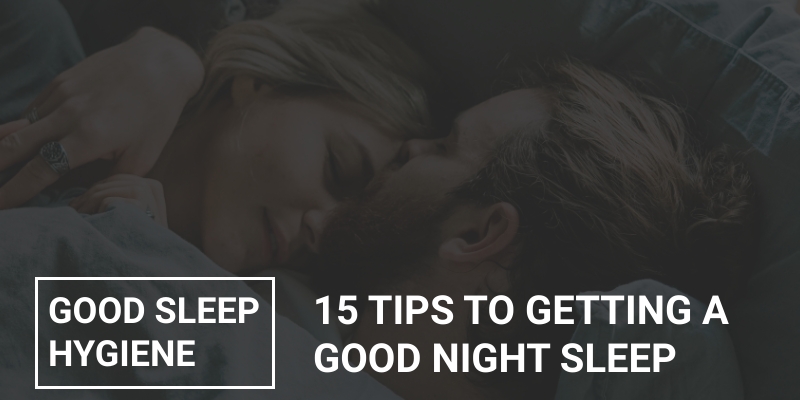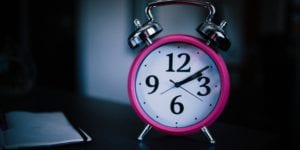
Tired of tossing and turning in your bed, wondering what time it is, and wishing you could just fall asleep? The things you do, or not do, during the day and before bedtime may prevent you from getting good, restorative, restful sleep. It is important to establish good sleep hygiene, or healthy habits that enable you to sleep well each and every night.
Check out these 15 tips on how to get a good night’s sleep to help you fall asleep faster, get more better sleep, and wake up feeling rested and refreshed.
1. Set a schedule
Go to bed at the same time each night and get up at the same time each morning, even on the weekends. On the weekends, avoid staying up late and sleeping in. Establishing a consistent regular sleep routine helps to regulate your body’s circadian rhythm i.e. your body’s 24-hour internal clock that regulates many functions, such as sleeping and wakefulness.
2. Limit or avoid naps, especially in the afternoon
Nap no more than 30 minutes in the early afternoon. Eliminate naps during the day if you find it difficult to fall asleep at bedtime.
3. Exercise
Make exercise a part of your regular routine. Exercise reduces stress and anxiety – common causes of difficulty falling asleep and remaining asleep – and improves your overall health. Exercising vigorously too close to bedtime, however, can leave you energized and prevent you from falling asleep. Opt for gentle stretching, yoga, tai chi, or a leisurely stroll for exercise, if it is within 4 hours of bedtime.
4. Avoid caffeine and nicotine close to bedtime
Restrict your last caffeine consumption to early afternoon hours, preferably before 2:00 pm. Caffeine is a stimulant which, when taken close to sleeping time, makes falling asleep and staying asleep difficult. Caffeine can be found in foods and drinks, such as coffee, chocolate (yes, chocolate!), soft drinks, energy drinks, and teas. Caffeine can also be found in medications, for example, in certain pain relievers.
Nicotine can affect how much and how well you sleep. Nicotine is a stimulant, like caffeine. Nicotine use close to bedtime may make falling asleep difficult.
5. Avoid alcohol before bed
Avoid drinking alcohol within two hours of bedtime. Alcohol can prevent you from getting restful, quality sleep during the night, resulting in fatigue the following day. Alcohol is also a diuretic, and may cause you to wake up in the middle of the night to go to the bathroom.
6. Avoid eating a meal close to bedtime
Resist eating your last meal within 3 hours before bedtime. Eating a meal too close to bedtime can cause heartburn, can lead to weight gain, and can affect your sleep. If you’re craving for food close to bedtime, opt for a light snack, such as a fruit, warm milk, or crackers.
7. Avoid electronics before bed
Avoid electronic devices, including cell-phones, televisions, tablets, laptops, e-readers, and gaming devices before bedtime. The light emanating from the screens of these devices can delay the release of melatonin, a hormone that promotes sleep.
8. Relax before bed
Take a warm bath, read a book, meditate, or listen to relaxing music to make it easier to fall sleep.

9. Don’t lie in bed awake
Avoid looking at the clock! If you can not fall asleep, do not lie in bed. Go into another room and do something else, such as reading, until you feel tired.
10. Try a different sleeping position
Your sleeping position can affect the quantity and quality of your sleep. Sleep in the position that you are most comfortable in. If you are not sleeping well, consider changing your sleeping position to see if you can get better sleep.
11. Optimize your sleep environment
Tidy and design your sleep environment to establish the conditions you need for good sleep.
Your bedroom should be cool.
Keep your room at a cool temperature between 60 to 67 degrees F (16 to 19 degrees C).
Your bedroom should be free from unnecessary noise that can disturb your sleep.
Consider ear plugs, “white noise” sound machines to drown out noise that is impacting you from falling asleep.
Your bedroom should be dark.
Consider using curtains, window shades, or a sleep mask.
12. Ensure your bed is comfortable
The mattress that you have been using for years may have exceeded its life expectancy. Most mattresses are good for about 8 years. If your mattress is uncomfortable, getting a new mattress can go a long way towards great sleep. An uncomfortable pillow or bedding can keep you from sleeping restfully as well and it may be time to get a new one.
13. Maintain a sleep diary 
A simple notebook to jot down details will do. Date the entry and include details such as the time you went to bed, the amount of time it took to fall asleep, the number of times you woke up during the night, the time you woke up in the morning and how you felt, medications taken, your caffeine and alcohol intake, time spent exercising, and your activities just prior to bedtime. A sleep diary may help you understand factors that may be impacting your ability to get good sleep.
14. Make a list of your medications
Some medications can affect sleep. Keep a list of all your prescription and over-the-counter medications, including supplements and herbal products. Bring your up-to-date medication list to your doctor. Do not stop taking a medication without first talking to your doctor.
15. See your doctor
If you continue to experience trouble falling asleep for longer than two weeks, or if you always feel tired the next day, bring your sleep diary and your medication list with you and see a physician for an evaluation.
Print out or bookmark this page and refer to it often while you establish healthy habits for good sleep. Practising good sleep hygiene and getting enough quality sleep will help you maintain better health and enjoy a better quality lifestyle.
If you have a question or a sleep tip that you would like to share with others, please leave your comments below.

4 Responses
How can I decide which sleep hygiene tips are best for me?
Think about your lifestyle and your sleep behaviors. List your habits that help you get good sleep and your habits that may be preventing you from getting restful sleep. Envision how much better off you could be if you got good sleep and see what changes in your habits you can make.
I found that I seem to feel well rested if I take a 30 minute nap somewhere between 4 and 6PM. At night I usually sleep around 6 hours. With all this combined, I wake up feeling rested and I usually don’t need any coffee or black/green tea to stay awake.
Sleep needs are personal and individual. Some people might need 8 hours of sleep. Others, like yourself, are fine with 6 hours of sleep. It depends on a lot of factors including your genetics, age, activity during the day, or just your body needs in general.
As long as you do not have insomnia, do not wake up feeling exhausted, and do not feel tired throughout the day, you may be fine. Just listen to your body. Your body will let you know.